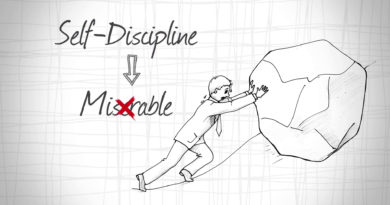Photo by Pawel Czerwinski on Unsplash
Ouvimos algo entre 10 e 200 mentiras por dia. E, ainda que tenhamos passado boa parte da nossa história tentando encontrar formas de detectar estas mentiras pelo monitoramento das reações fisiológicas nos mentirosos, estes métodos se provaram ineficientes. Existe alguma abordagem mais direta?
Noah Zandan usa alguns exemplos de mentiras famosas para ilustrar como nós podemos utilizar a ciência da comunicação para analisar as próprias mentiras.
Lição de Noah Zandan, animação de The Moving Company Animation Studio.
Fonte: (Youtube.com)
| Audio | |
|---|---|
Normal | Slow |
| English Transcript | Tradução |
| "Sorry, my phone died." | "Desculpe, a bateria acabou." |
| "It's nothing. I'm fine." | "Não é nada. Eu estou bem." |
| "These allegations are completely unfounded." | "Estas alegações não tem fundamento." |
| "The company was not aware of any wrongdoing." | "A companhia não estava ciente de nenhuma irregularidade." |
| "I love you." | "Eu te amo." |
| We hear anywhere from 10 to 200 lies a day, and we spent much of our history coming up with ways to detect them, from medieval torture devices to polygraphs, blood-pressure and breathing monitors, voice-stress analyzers, eye trackers, infrared brain scanners, and even the 400-pound electroencephalogram. | Nós ouvimos algo entre 10 e 200 mentiras por dia, e passamos boa parte de nossa história criando formas de detectá-las, desde instrumentos de tortura medievais a polígrafos, monitores de pressão e respiração, analisadores de estresse vocal, detectores oculares, escâner infravermelho cerebral e até mesmo o eletroencefalograma de 180 quilogramas. |
| But although such tools have worked under certain circumstances, most can be fooled with enough preparation, and none are considered reliable enough to even be admissible in court. | Embora estas ferramentas tenham funcionado em certas circunstâncias, muitas podem ser enganadas com treino suficiente e nenhuma é confiável o bastante para ser admitida num julgamento. |
| But, what if the problem is not with the techniques, but the underlying assumption that lying spurs physiological changes? | Mas e se o problema não estiver nas técnicas, mas na premissa de que mentir desencadeia mudanças fisiológicas? |
| What if we took a more direct approach, using communication science to analyze the lies themselves? | Que tal abordarmos isto mais diretamente, usando a ciência da comunicação para analisar as próprias mentiras? |
| On a psychological level, we lie partly to paint a better picture of ourselves, connecting our fantasies to the person we wish we were rather than the person we are. | No nível psicológico nós mentimos, em parte, para pintar uma imagem melhor de nós mesmos, conectando nossas fantasias à pessoa que desejaríamos ser, em vez da pessoa que somos. |
| But while our brain is busy dreaming, it's letting plenty of signals slip by. | Mas enquanto o cérebro ocupa-se em sonhar, ele deixa vários sinais escaparem. |
| Our conscious mind only controls about 5% of our cognitive function, including communication, while the other 95% occurs beyond our awareness, and according to the literature on reality monitoring, stories based on imagined experiences are qualitatively different from those based on real experiences. | Nossa mente consciente controla apenas em torno de 5% de nossa função cognitiva, incluindo a comunicação, enquanto os outros 95% acontecem além da nossa percepção, e de acordo com a literatura sobre o monitoramento da realidade, as histórias baseadas em experiências imaginadas são qualitativamente diferentes daquelas baseadas em experiências reais. |
| This suggests that creating a false story about a personal topic takes work and results in a different pattern of language use. | Isto sugere que criar uma história falsa sobre um assunto pessoal dá trabalho e resulta em um padrão de uso da linguagem diferente. |
| A technology known as linguistic text analysis has helped to identify four such common patterns in the subconscious language of deception. | Uma tecnologia conhecida como "análise textual linguística" tem ajudado a identificar quatro desses padrões comuns na linguagem subconsciente da enganação. |
| First, liars reference themselves less, when making deceptive statements. | Primeiro, mentirosos se referem menos a si mesmos quando mentem. |
| They write or talk more about others, often using the third person to distance and disassociate themselves from their lie, which sounds more false: "Absolutely no party took place at this house," or "I didn't host a party here." | Eles escrevem ou falam mais sobre outros, usando frequentemente a terceira pessoa, afastando-se e dissociando-se eles mesmos de sua mentira, qual soa mais falsa: "Absolutamente nenhuma festa ocorreu nesta casa.", ou "Eu não dei uma festa aqui."? |
| Second, liars tend to be more negative, because on a subconscious level, they feel guilty about lying. | Segundo, mentirosos tendem a ser mais negativos porque inconscientemente eles se sentem culpados por mentir. |
| For example, a liar might say something like, "Sorry, my stupid phone battery died. I hate that thing." | Por exemplo, um mentiroso poderia dizer algo do tipo: "Desculpe, a droga da bateria acabou. Odeio esse telefone." |
| Third, liars typically explain events in simple terms since our brains struggle to build a complex lie. | Terceiro, mentirosos tipicamente explicam eventos em termos simples: é trabalhoso para o cérebro criar uma mentira complexa. |
| Judgment and evaluation are complex things for our brains to compute. | Julgamento e avaliação são coisas complexas para nossos cérebros calcularem. |
| As a U.S. President once famously insisted: "I did not have sexual relations with that woman." | Ficou famosa a negativa insistente de um presidente dos EUA: "Eu NÃO tive relações sexuais com aquela mulher." |
| And finally, even though liars keep descriptions simple, they tend to use longer and more convoluted sentence structure, inserting unnecessary words and irrelevant but factual sounding details in order to pad the lie. | Por fim, embora os mentirosos descrevam as coisas de modo simples, eles tendem a usar uma estrutura de sentenças mais longa e complicada, inserindo palavras desnecessárias e detalhes irrelevantes porém válidos para encobrir a mentira. |
| Another President confronted with a scandal proclaimed: "I can say, categorically, that this investigation indicates that no one on the White House staff, no one in this administration presently employed was involved in this very bizarre incident." | Outro Presidente confrontado com um escândalo proclamou: "Posso dizer categoricamente que esta investigação indica que ninguém na equipe da Casa Branca, ninguém nesta administração atualmente empregado, estava envolvido neste incidente bizarro." |
| Let's apply linguistic analysis to some famous examples. | Vamos aplicar a análise linguística a alguns exemplos famosos. |
| Take seven-time Tour de France winner Lance Armstrong. | Analisemos o heptacampeão do Tour de France Lance Armstrong. |
| When comparing a 2005 interview, in which he had denied taking performance-enhancing drugs to a 2013 interview, in which he admitted it, his use of personal pronouns increased by nearly 3/4. | Quando comparamos uma entrevista de 2005, na qual ele negou ter usado doping com outra entrevista em 2013, na qual ele o admitiu, o seu uso de pronomes pessoais aumentou quase 75%. |
| Note the contrast between the following two quotes. | Perceba o contraste entre as declarações a seguir. |
| First: "Okay, you know, a guy in a French, in a Parisian laboratory opens up your sample, you know, Jean-Francis so-and-so, and he tests it. And then you get a phone call from a newspaper that says: 'We found you to be positive six times for EPO." | Primeira: "Certo, você sabe, um cara num laboratório francês, parisiense abre a sua amostra, você sabe, Jean-Francis e tal, e ele a testa. E um telefonema de um jornal lhe avisa: 'Seu exame de EPO (eritropoetina) deu seis vezes positivo''. |
| Second: "I lost myself in all of that. I'm sure there would be other people that couldn't handle it, but I certainly couldn't handle it, and I was used to controlling everything in my life. I controlled every outcome in my life." | Segunda: "Fiquei perdido naquilo tudo. Outros talvez não aguentassem, mas com certeza eu aguentaria, e eu estava acostumado a controlar tudo na minha vida. Eu controlei todas as situações na minha vida." |
| In his denial, Armstrong described a hypothetical situation focused on someone else, removing himself from the situation entirely. | Em sua negação, Armstrong descreveu uma situação hipotética focada em outra pessoa, removendo a si mesmo da situação completamente. |
| In his admission, he owns his statements, delving into his personal emotions and motivations. | Na sua admissão, assume suas afirmativas, mergulhando em suas emoções pessoais e motivações. |
| But the use of personal pronouns is just one indicator of deception. | Porém, o uso de pronomes pessoais é apenas um indicador de mentira. |
| Let's look at another example from former Senator and U.S. Presidential candidate John Edwards: "I only know that the apparent father has said publicly that he is the father of the baby. I also have not been engaged in any activity of any description that requested, agreed to, or supported payments of any kind to the woman or to the apparent father of the baby." | Vamos analisar outro exemplo do ex-Senador e candidato à presidência dos E.U. A John Edwards: "Eu só sei que o suposto pai disse publicamente que ele é o pai deste bebê. E nem me envolvi em qualquer tipo de atividade que solicitou, concordou com, ou apoiou pagamentos de qualquer tipo para a mulher ou para o suposto pai do bebê." |
| Not only is that a pretty long-winded way to say, "The baby isn't mine," but Edwards never calls the other parties by name, instead saying "that baby," "the woman," and "the apparent father." | Além de dizer de forma muito longa "o bebê não é meu", Edwards nunca chama as outras partes pelo nome, em vez disso, ele diz "o bebê", "a mulher" e "o suposto pai". |
| Now let's see what he had to say when later admitting paternity: "I am Quinn's father. I will do everything in my power to provide her with the love and support she deserves." | Vejamos o que ele disse depois, quando assumiu a paternidade: "Eu sou o pai de Quinn. Farei tudo ao meu alcance para dar a ela o amor e apoio que ela merece." |
| The statement is short and direct, calling the child by name and addressing his role in her life. | Esta declaração é curta e direta, chamando a criança por seu nome e abordando o seu papel na vida dela. |
| So how can you apply these lie-spotting techniques to your life? | Como usar estas técnicas de detectar mentiras em sua vida? |
| First, remember that many of the lies we encounter on a daily basis are far less serious that these examples, and may even be harmless. | Primeiro, lembre-se que muitas mentiras com que nós convivemos todos os dias são muito menos sérias que as dos exemplos e podem até ser inócuas. |
| But it's still worthwhile to be aware of telltale clues, like minimal self-references, negative language, simple explanations and convoluted phrasing. | Ainda assim, vale a pena prestar atenção às dicas reveladoras, como poucas referências a si mesmo, linguagem negativa, explicações simples e com frases complicadas. |
| It just might help you avoid an overvalued stock, an ineffective product, or even a terrible relationship. | Isto pode lhe ajudar a evitar comprar ações supervalorizadas, algum produto ineficiente, ou até mesmo um relacionamento péssimo. |
| Tradutor: Guilherme Dias Revisor: Ruy Lopes Pereira | |
Contagem de palavras
A tabela abaixo exibe as palavras encontradas neste vídeo bem como o número de vezes em que aparecem.
Veja também: Para que serve esta tabela?
| Freq. | Palavra | Freq. | Palavra | Freq. | Palavra |
|---|---|---|---|---|---|
| 32 | the | 27 | to | 25 | a |
| 23 | and | 19 | in | 17 | of |
| 16 | that | 13 | I | 9 | but |
| 8 | we | 8 | our | 8 | on |
| 7 | you | 7 | from | 7 | be |
| 6 | with | 6 | is | 6 | his |
| 6 | he | 6 | are | 5 | this |
| 5 | or | 5 | not | 5 | my |
| 5 | more | 5 | lie | 5 | it |
| 5 | father | 5 | even | 4 | use |
| 4 | say | 4 | personal | 4 | life |
| 4 | liars | 4 | by | 4 | baby |
| 4 | any | 4 | about | 3 | woman |
| 3 | which | 3 | when | 3 | what |
| 3 | was | 3 | they | 3 | these |
| 3 | themselves | 3 | so | 3 | simple |
| 3 | phone | 3 | person | 3 | other |
| 3 | only | 3 | one | 3 | no |
| 3 | lies | 3 | let's | 3 | language |
| 3 | know | 3 | it's | 3 | have |
| 3 | for | 3 | first | 3 | can |
| 3 | apparent | 2 | your | 2 | while |
| 2 | using | 2 | up | 2 | u |
| 2 | took | 2 | third | 2 | tend |
| 2 | techniques | 2 | such | 2 | subconscious |
| 2 | statements | 2 | sorry | 2 | situation |
| 2 | second | 2 | s | 2 | pronouns |
| 2 | president | 2 | party | 2 | negative |
| 2 | name | 2 | might | 2 | lying |
| 2 | love | 2 | linguistic | 2 | like |
| 2 | level | 2 | less | 2 | just |
| 2 | interview | 2 | I'm | 2 | if |
| 2 | house | 2 | her | 2 | has |
| 2 | handle | 2 | had | 2 | false |
| 2 | experiences | 2 | examples | 2 | example |
| 2 | everything | 2 | enough | 2 | edwards |
| 2 | direct | 2 | different | 2 | died |
| 2 | deception | 2 | couldn't | 2 | convoluted |
| 2 | complex | 2 | communication | 2 | brains |
| 2 | brain | 2 | based | 2 | aware |
| 2 | at | 2 | as | 2 | armstrong |
| 2 | apply | 2 | another | 2 | analysis |
| 2 | an | 2 | % | 1 | wrongdoing |
| 1 | write | 1 | would | 1 | worthwhile |
| 1 | worked | 1 | work | 1 | words |
| 1 | wish | 1 | winner | 1 | winded |
| 1 | will | 1 | white | 1 | were |
| 1 | 'we | 1 | ways | 1 | way |
| 1 | voice | 1 | very | 1 | used |
| 1 | unnecessary | 1 | unfounded | 1 | underlying |
| 1 | under | 1 | typically | 1 | two |
| 1 | trackers | 1 | tour | 1 | torture |
| 1 | topic | 1 | tools | 1 | times |
| 1 | time | 1 | though | 1 | those |
| 1 | things | 1 | thing | 1 | there |
| 1 | then | 1 | them | 1 | their |
| 1 | than | 1 | text | 1 | tests |
| 1 | terrible | 1 | terms | 1 | telltale |
| 1 | technology | 1 | talk | 1 | taking |
| 1 | takes | 1 | take | 1 | sure |
| 1 | supported | 1 | support | 1 | suggests |
| 1 | stupid | 1 | struggle | 1 | structure |
| 1 | stress | 1 | story | 1 | stories |
| 1 | stock | 1 | still | 1 | statement |
| 1 | staff | 1 | spurs | 1 | spotting |
| 1 | spent | 1 | sounds | 1 | sounding |
| 1 | something | 1 | someone | 1 | some |
| 1 | slip | 1 | six | 1 | since |
| 1 | signals | 1 | short | 1 | she |
| 1 | sexual | 1 | seven | 1 | serious |
| 1 | sentence | 1 | senator | 1 | self |
| 1 | see | 1 | science | 1 | scanners |
| 1 | scandal | 1 | says | 1 | saying |
| 1 | sample | 1 | said | 1 | role |
| 1 | results | 1 | requested | 1 | removing |
| 1 | remember | 1 | reliable | 1 | relationship |
| 1 | relations | 1 | references | 1 | reference |
| 1 | reality | 1 | real | 1 | rather |
| 1 | quotes | 1 | quinn's | 1 | qualitatively |
| 1 | publicly | 1 | psychological | 1 | provide |
| 1 | product | 1 | proclaimed | 1 | problem |
| 1 | pretty | 1 | pressure | 1 | presidential |
| 1 | presently | 1 | preparation | 1 | power |
| 1 | pound | 1 | positive | 1 | polygraphs |
| 1 | plenty | 1 | place | 1 | picture |
| 1 | physiological | 1 | phrasing | 1 | performance |
| 1 | people | 1 | payments | 1 | patterns |
| 1 | pattern | 1 | paternity | 1 | partly |
| 1 | parties | 1 | parisian | 1 | paint |
| 1 | pad | 1 | owns | 1 | overvalued |
| 1 | outcome | 1 | ourselves | 1 | others |
| 1 | order | 1 | opens | 1 | once |
| 1 | okay | 1 | often | 1 | occurs |
| 1 | now | 1 | nothing | 1 | note |
| 1 | none | 1 | newspaper | 1 | never |
| 1 | nearly | 1 | myself | 1 | much |
| 1 | motivations | 1 | most | 1 | monitors |
| 1 | monitoring | 1 | minimal | 1 | mine |
| 1 | mind | 1 | medieval | 1 | may |
| 1 | many | 1 | making | 1 | lost |
| 1 | look | 1 | longer | 1 | long |
| 1 | literature | 1 | liar | 1 | letting |
| 1 | later | 1 | lance | 1 | laboratory |
| 1 | known | 1 | kind | 1 | keep |
| 1 | judgment | 1 | john | 1 | jean |
| 1 | isn't | 1 | irrelevant | 1 | involved |
| 1 | investigation | 1 | into | 1 | instead |
| 1 | insisted | 1 | inserting | 1 | infrared |
| 1 | ineffective | 1 | indicator | 1 | indicates |
| 1 | increased | 1 | including | 1 | incident |
| 1 | imagined | 1 | identify | 1 | hypothetical |
| 1 | how | 1 | host | 1 | history |
| 1 | himself | 1 | here | 1 | helped |
| 1 | help | 1 | hear | 1 | hate |
| 1 | harmless | 1 | guy | 1 | guilty |
| 1 | get | 1 | function | 1 | french |
| 1 | francis | 1 | france | 1 | four |
| 1 | found | 1 | former | 1 | fooled |
| 1 | following | 1 | focused | 1 | fine |
| 1 | finally | 1 | feel | 1 | far |
| 1 | fantasies | 1 | famously | 1 | famous |
| 1 | factual | 1 | eye | 1 | explanations |
| 1 | explain | 1 | every | 1 | events |
| 1 | evaluation | 1 | epo | 1 | entirely |
| 1 | enhancing | 1 | engaged | 1 | encounter |
| 1 | employed | 1 | emotions | 1 | else |
| 1 | electroencephalogram | 1 | drugs | 1 | dreaming |
| 1 | do | 1 | distance | 1 | disassociate |
| 1 | didn't | 1 | did | 1 | devices |
| 1 | detect | 1 | details | 1 | deserves |
| 1 | descriptions | 1 | description | 1 | described |
| 1 | denied | 1 | denial | 1 | delving |
| 1 | deceptive | 1 | de | 1 | day |
| 1 | daily | 1 | creating | 1 | court |
| 1 | controls | 1 | controlling | 1 | controlled |
| 1 | contrast | 1 | considered | 1 | conscious |
| 1 | connecting | 1 | confronted | 1 | compute |
| 1 | completely | 1 | comparing | 1 | company |
| 1 | common | 1 | coming | 1 | cognitive |
| 1 | clues | 1 | circumstances | 1 | child |
| 1 | changes | 1 | certainly | 1 | certain |
| 1 | categorically | 1 | candidate | 1 | calls |
| 1 | calling | 1 | call | 1 | busy |
| 1 | build | 1 | breathing | 1 | blood |
| 1 | bizarre | 1 | beyond | 1 | between |
| 1 | better | 1 | been | 1 | because |
| 1 | battery | 1 | basis | 1 | awareness |
| 1 | avoid | 1 | assumption | 1 | approach |
| 1 | anywhere | 1 | analyzers | 1 | analyze |
| 1 | am | 1 | although | 1 | also |
| 1 | allegations | 1 | all | 1 | agreed |
| 1 | admitting | 1 | admitted | 1 | admission |
| 1 | admissible | 1 | administration | 1 | addressing |
| 1 | activity | 1 | according | 1 | absolutely |










